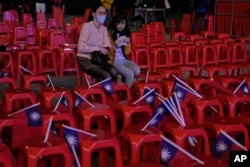Taiwan's ruling Democratic Progressive Party secured an unprecedented third consecutive presidential term on Saturday, with the party's candidate, current Taiwan Vice President Lai Ching-te, winning 40% of the ballot.
He defeated Hou You-ih, a presidential candidate for the China-friendly opposition party Kuomintang (KMT) and a former police chief, as well as Ko Wen-je, the presidential candidate of Taiwan People's Party, who has tried to present his party as an alternative to the two main parties.
During his victory speech, Lai said his win on Saturday is a victory for the global community democracies.
"We are telling the international community that between democracy and authoritarianism, we will stand on the side of democracy," he told a room of more than 100 local and international journalists.
He noted that Taiwanese people have successfully resisted external forces' attempts to interfere in the election, hinting at the wide range of tactics used by China during the months-long presidential campaign. "We trust that only the people of Taiwan have the right to choose their own president," he added.
Because he and his vice-presidential candidate Hsiao Bi-Khim received the most votes in the election, Lai said Taiwan will continue to "walk on the right path forward."
"We will not turn around or look backward," he emphasized.
Reiterating his commitment to maintaining peace and stability across the Taiwan Strait, Lai expressed his willingness to engage with Beijing on the basis of dignity and parity.
"We will use exchanges to replace obstructionism, dialogue to replace confrontation, and confidently pursue exchanges and cooperation with China," he said.
'I've let you down,' says Hou
KMT's Hou gave his concession speech at 8 p.m. local time, apologizing for failing to help the main opposition party return to power but emphasizing that he had done everything he could throughout the campaign.
"I've let you down and I'm here to express my deepest apology," he told a group of disappointed supporters and bowed twice.
Some analysts say the presidential election outcome shows that more Taiwanese people support Taiwan in maintaining the current administration's foreign policy approach of maintaining a distance from Beijing and continuing to deepen ties with the U.S.
"This result shows that many Taiwanese people approve the Tsai administration's approach of building closer ties with like-minded countries," Yen Wei-Ting, an expert on Taiwan politics at Franklin and Marshall College, told VOA by phone.
Other experts say the presidential election result also suggests that Taiwanese voters remain cautious about electing a leader who advocates closer ties with China. "This certainly shows that there's no consensus on a more conciliatory approach with China," Timothy Rich, an expert on Taiwan politics at Western Kentucky University, told VOA in a written response.
During the presidential campaign, DPP's Lai repeatedly characterized the election as "a choice between democracy and autocracy" while the KMT's Hou framed the election as "a choice between war and peace."
Over the last few months, Lai focused on highlighting the threats posed by China's growing military maneuvers around Taiwan and Beijing's coercive economic measures. On the other hand, KMT's Hou vowed to restart dialogue and exchange with China, blaming the DPP-led government for taunting Beijing and heightening the risk of a war across the Taiwan Strait over the last eight years.
Some voters express relief
Some Taiwanese voters told VOA that the election outcome makes them feel relieved because Lai's victory suggests Taiwan will continue to deepen ties with like-minded democracies like the U.S. and this approach can help Taiwan counter the growing pressure and threats imposed by Beijing.
"I think there won't be much change to Taiwan's diplomatic approach and defense policies, and this will allow Taiwan to further increase its international visibility, which is something positive for us," Anthony Yang, a 36-year-old commercial airplane pilot in Taoyuan City, told VOA in a written response.
However, with no political party securing a majority in Taiwan's legislature, Yang worries that the DPP-led government won't be able to smoothly implement certain policies, such as policies aimed at strengthening Taiwan's defense capabilities.
"Since the DPP fails to secure a majority in the legislature, its attempt to implement policies won't be smooth and Taiwan will likely make much less progress for the next four years," he said.
While some voters feel relieved by the election outcome, others say nothing will change in Taiwan for the next four years, and they worry China's pressure on Taiwan will continue to increase. "China will likely put more pressure on Taiwan, and it will be much harder for Taiwanese companies to do business in China," Chin Szu, a 38-year-old engineer in Taipei City, told VOA in a phone call.
In his view, the next Taiwanese government should focus on improving Taiwan's economy and avoid putting too much effort into confronting China. "They should do whatever they can to help improve Taiwan's economy because that's what many Taiwanese people like me would prefer," Szu said.
China, US offer different takes
Following the DPP's historic victory Saturday, China and the U.S. provided opposing reactions to the election outcome. In a brief statement, the U.S. State Department congratulated Lai on his victory and praised the Taiwanese people for "demonstrating the strength" of the island's robust democratic system and electoral process.
"The United States is committed to maintaining cross-Strait peace and stability and the peaceful resolution of differences, free from coercion and pressure," the State Department said, underscoring the people-to-people ties between Taipei and Washington are rooted in democratic values and will continue to broaden and deepen across multiple sectors.
When asked what he thought about the outcome of the Taiwan election, U.S. President Joe Biden said the U.S. doesn't support independence, without elaborating.
On the same night, the Chinese Communist Party's Taiwan Affairs Office issued a stern warning, claiming the election outcome doesn't represent Taiwan's mainstream public opinion.
"Taiwan is China's Taiwan, and the election can't change the basic pattern and direction of development of cross-strait relations," Chen Binhua, the spokesperson of the Taiwan Affairs Office said in a statement. "The outcome can't stop the trend that the motherland will eventually be reunified [with Taiwan.]"















